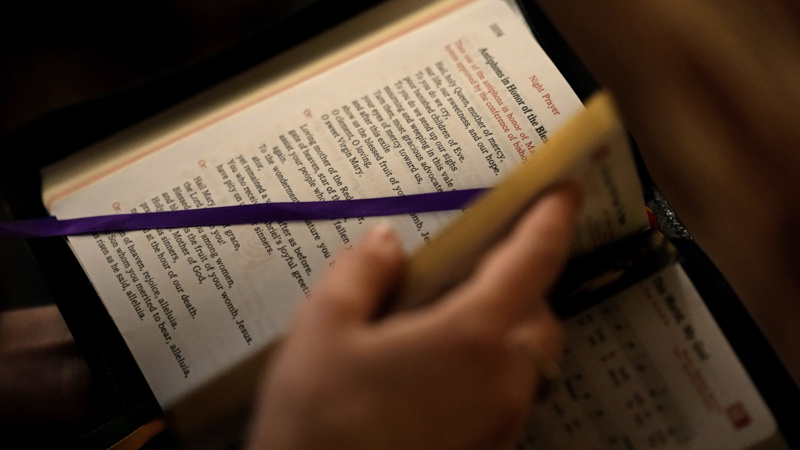Christianity declines among U.S. adults while “religiously unaffiliated” grows, study says
The portion of the U.S. population identifying as Christian has declined significantly over the last two decades, but a massive new Pew Research study finds that trend may be leveling off.
The study, which surveyed 37,000 Americans, found that 62% identify as Christian. By comparison, when Pew did a similar study in 2007, 78% said they were Christian.
Most of that decline occurred until 5 years ago, when it began to level off, according to the Pew study.
The current Christian breakdown in the U.S. is that 40% identify as Protestant, 19% identify as Catholic and the remaining 3% say they are Christian without specifying additional denomination.
All three major branches of Protestantism have declined in share of the population since 2007. Evangelical Protestants now make up 23%, down from 26%. Mainline Protestants account for 11% of U.S. adults, down from 18%. And people who attend historically Black Protestant churches make up 5% of the population, down from 7%.
The survey included nearly 37,000 U.S. adults and was conducted in 2023 and 2024.
Being religiously unaffiliated is far more common today
Pew also found that nearly three in 10 people identify as religiously unaffiliated, which can mean atheist, agnostic, or no religion in particular. Younger adults who were raised in only nominally religious homes or outside of religion all together are more likely to be unaffiliated than are older adults.
“You have more and more people who have no religion having children,” says Greg Smith, senior associate director of religion research at Pew. “So you have more and more people who as children were raised with no religion and many of them grow up to be not particularly religious themselves.”
Some people who are now unaffiliated left Christianity, specifically. Pew found that religion is less “sticky” than it once was from generation to generation, even among people raised in a specific faith. Meanwhile, those from nonreligous upbringings tend to remain nonreligous as adults.
American religious diversity is growing
Pew also found that the percentage of U.S. adults who identify as a religion other than Christian is on the rise. It’s now about 7% compared to less than 5% in 2007.
Jews make up 2% of the population, while Muslims, Buddhists and Hindus each account for about 1% of the population. A number of other, smaller religious groups make up the balance of non-Christian adherents.
While there’s significant political rhetoric from the Trump administration that casts Christians as an embattled minority, the actual numbers don’t show that to be the case.
Nearly six in 10 immigrants to the U.S. are Christian, which tracks with the overall population. But there are also larger portions of Muslims, Buddhists and Hindus among immigrants than in the population as a whole.
Christians lose ground among liberals
One major change in recent years is the portion of liberals who identify as Christian. Back in 2007, Pew found that nearly two-thirds of those who were politically liberal were also Christian. Now, that number has dropped to just over one-third of liberals who say they’re Christian. While the portion of conservatives who identify as Christian is now lower as well, that drop is fairly small in comparison.
The survey also revealed some new information about gender and religious practice. Women remain more religious than men by a number of measures, from attending worship regularly to praying daily. But the gender gap is narrowing among younger people.
For example, For example, in 2007, the share of women who said they pray daily exceeded the share of men who did so by 17 percentage points. In the new survey, women still report praying at higher rates than men, but the difference is 13 points now.
Historically women have been the ones who keep houses worship running, so the narrowing of that gap raises the question of whether these younger men will step in and do that daily work in churches and mosques and synagogues.
31 workers reach safety after partial collapse of Los Angeles industrial tunnel
Construction workers inside a huge industrial tunnel in Los Angeles made it to safety after a portion of it collapsed Wednesday evening, an outcome officials called a blessing.
U.S. issues sanctions against United Nations investigator probing abuses in Gaza
The State Department's decision to impose sanctions on Francesca Albanese, the U.N. special rapporteur for the West Bank and Gaza, follows an unsuccessful campaign to force her removal.
New data reveals FEMA missed major flood risks at Camp Mystic
The data also highlights critical risks in other areas along the Guadalupe River in Kerr County, revealing more than twice as many Americans live in flood prone areas than FEMA's maps show.
Trump sets 50% tariff rate for Brazil, blasting treatment of former far-right president
President Trump defended former Brazilian President Jair Bolsonaro, who is accused of plotting an attempted coup following his loss in the 2022 election.
Former White House doctor declines to testify in GOP probe of Biden’s mental acuity
Kevin O'Connor cited doctor-patient confidentiality and his Fifth Amendment right against self-incrimination in deciding not to answer questions from Republicans on the House Oversight Committee.
Celine Song had too much fun as a matchmaker
Filmmaker Celine Song isn't religious, but that doesn't stop her from seeing certain dead insects as signs in her life and treating a good meal like prayer.







